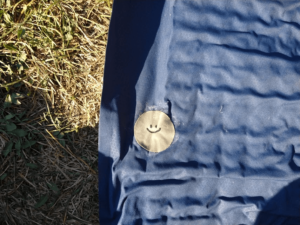 My sleeping pad popped on the sixth day of the semester. Gear failure was my worst fear for the course, and it came true at a time when I least expected it. I woke up on a flat mat on the third day of an eight-day hike, and because of my lack of preparation, I had no way to fix it. Standing in REI, preparing for this trip, I was convinced that my sleeping mat could not pop, and that I had no need to purchase a patch kit I would never use.
My sleeping pad popped on the sixth day of the semester. Gear failure was my worst fear for the course, and it came true at a time when I least expected it. I woke up on a flat mat on the third day of an eight-day hike, and because of my lack of preparation, I had no way to fix it. Standing in REI, preparing for this trip, I was convinced that my sleeping mat could not pop, and that I had no need to purchase a patch kit I would never use.
I was wrong.
Over the remaining days of our trek, I tried everything in my power to fix the hole using the few resources I had. The first step was submerging the pad in the creek to find the hole. Once located, I patched the hole, or so I thought, because I woke up on morning four with a flat mat again. Tape didn’t fix the problem either, and I woke up morning after morning frustrated that there seemed to be nothing I could do to fix my problem.
Something I have learned from this semester so far is that everything in the backcountry is slower. Dishes take longer than I am used to, cooking takes longer, getting ready in the morning takes longer. My sleeping pad took five days to fix, rather than an afternoon and one car trip to REI. I really like this slowness because it allows us to give greater attention to these daily tasks when technological luxuries that speed up these processes are removed.
I think this slowness is what scares a lot of people about being in the backcountry, disconnected from the modern world and all its inventions. Having to wake up on a flat mat for several mornings in a row is not something that I would have put up with had I been in a town. I would have bought a repair kit – or maybe even a new sleeping mat if I had determined the old one unfixable – in much less time than it took me to solve my problem in the backcountry. Not having that quick fix can be very uncomfortable, in my case, both physically and psychologically. Stepping outside your comfort zone can be a difficult thing to do. It forces you to try new things, to problem solve, and to learn from your mistakes.
The idea of gear breaking in the backcountry made me so uncomfortable that I did not even want to think about the possibility of it happening, but after my long repair journey, I have learned many things from my mistake. Preparing for the worst is not a terrible idea. It’s also okay to work slowly through a problem to discover a solution that actually works. When all of this is over, my comfort zone will have expanded. With this experience and my newfound expertise, situations like this will hopefully be less stressful and something I will be able to handle with confidence.
I have really appreciated the slowness of being away from the busy lifestyle of college. Over dinner the other day, one of my classmates, Anna, reminded us of the Lao Tzu quote that goes “Nature does not hurry, yet everything is accomplished.” We have talked about several issues through this lens throughout the course. Fire, and the forest’s reaction to it, is a good example. A forest fire is unplanned, and creates a large disturbance in the system. The ecosystem has a learned resilience and slowly fixes the problem, adapting to become stronger and more capable of bouncing back efficiently. Some plants have learned to thrive with this disturbance, and some need it to continue reproducing.
I think this message can also be a powerful lens to view my problem through. It would have been so easy to get frustrated and believe there was no solution, or that the problem was too big to fix. Instead, I took my time, worked through the problem, and found a solution that worked.
My repair journey (hopefully) came to a close on the last morning of our time in the backcountry. It felt amazing, after all the problem solving I had done, to wake up and not feel the rocks under the tent. Despite how uncomfortable the whole experience was, I would not have traded it for a car trip to REI. Working to find a solution has taught me a lot about patience, expanding my comfort zone, and how to use a patch kit.